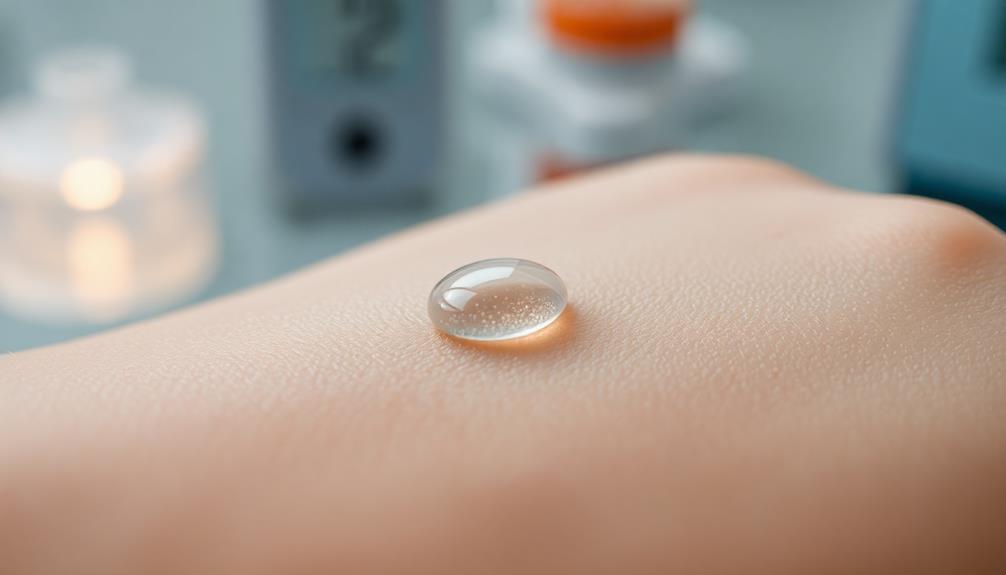Diabetic sweat can have some unique smells that tell you a lot about your health! You might notice a fruity scent, which means your body is producing ketones due to high blood sugar. This often happens during times of stress or exercise. Alternatively, a vinegar-like smell could indicate a metabolic imbalance, and an ammonia smell could suggest kidney issues. Recognizing these odors is important for keeping your diabetes in check. If you notice any changes, it's a good idea to check your blood sugar and consult a healthcare professional. There's even more to discover about managing these scents effectively!
Key Takeaways
- Diabetic sweat often has a fruity odor due to ketone production during high blood sugar levels or diabetic ketoacidosis.
- A vinegar-like smell may indicate metabolic imbalances or episodes of ketoacidosis.
- An ammonia-like scent may suggest kidney issues or a build-up of urea in the body.
- Changes in sweat odor can signal the need for blood sugar monitoring and potential medical evaluation.
- Increased sweating and interaction with skin bacteria can create varied and unusual odors in diabetic individuals.
Introduction

Understanding the distinctive smell of diabetic sweat is crucial for managing your diabetes effectively. When your blood sugar levels are high, your body produces more ketones, which can give your sweat a fruity smell. This odor is essential to recognize, as it can indicate that you need to take action regarding your diabetes management. Additionally, a high level of ketones in your body may not only affect your sweat but also other bodily functions. For instance, some individuals with diabetes notice changes in bowel odor, sparking a conversation about the **diabetes and poop smell connection**. These changes can be a result of fluctuating blood sugar levels and altered digestion, making it even more critical to monitor your symptoms closely.
Sometimes, if your diabetes isn't well-controlled, you might experience acidosis, leading to a vinegar-like smell in your sweat. This happens when your body tries to get rid of excess ketones.
Increased sweating can also occur, and when this sweat interacts with skin bacteria, it can create different odors, including ammonia or that sweet, fruity scent.
Description of the Smell

The smell of diabetic sweat can be quite distinct and often serves as a warning sign for those managing diabetes. You might notice a fruity odor in your sweat, which is caused by ketones. These are produced when your body breaks down fat for energy instead of glucose, especially during diabetic ketoacidosis.
If you detect this fruity smell, it's important to seek medical attention, as it could mean your blood sugar levels are too high.
Sometimes, diabetic sweat might also have an ammonia-like scent. This can happen if your kidneys aren't working well or if there's a build-up of urea in your body. You may even notice a vinegar-like smell, particularly during ketoacidosis episodes.
Changes in body odor can be significant signals for monitoring your health. If you notice these changes, it's crucial to check your blood sugar levels and consider reaching out to your healthcare provider.
Being aware of these smells helps you take charge of your health, ensuring you stay safe and well. Remember, your body often gives you signs—pay attention to them!
Source and Composition

Diabetic sweat often contains unique compounds that contribute to its distinctive smells, reflecting your body's metabolic state. One of the most notable characteristics of diabetic sweat is its fruity odor, which comes from ketones. These ketones are produced when your body breaks down fat for energy instead of glucose, especially during a condition called diabetic ketoacidosis.
Additionally, your sweat might carry a vinegar-like smell due to elevated levels of acetic acid, another byproduct of metabolic changes. If your diabetes isn't well managed, you might even notice an ammonia-like scent in your sweat. This occurs when your body is processing excess urea and nitrogen waste.
It's important to remember that the smell of your diabetic sweat can vary based on your blood sugar levels. Higher ketone levels generally lead to more intense odors.
These unique smells can indicate your metabolic health. If you notice significant changes in the smell of your sweat, it may be time to seek medical attention. Keeping track of these signs can help you manage your diabetes more effectively and maintain your well-being.
Typical Scenarios or Environments

Sweating can vary significantly in different scenarios, especially for those managing diabetes. When you're under high stress or engaging in physical exertion, your body might produce more diabetic sweat. This can lead to a stronger fruity odor, caused by the presence of ketones in your body.
If your blood sugar levels exceed 240 mg/dL, your body may start producing ketones, intensifying that distinct smell.
In scenarios where kidney function is compromised, you might notice an ammonia-like smell in your sweat. This happens when sweat mixes with skin bacteria, creating unusual sweat odors that can indicate potential health concerns.
If you experience this, it's essential to monitor your symptoms closely.
Always pay attention to your body's signals. If you notice any significant changes in your sweat odor, especially a strong fruity smell or ammonia-like scent, it might be time to check your blood sugar levels or consult your healthcare provider.
Emotional or Cultural Associations

Many people may not realize how emotional and cultural factors intertwine with the odors associated with diabetes. Diabetic sweat, especially during ketoacidosis, can smell fruity or like acetone. This odor often raises concern or confusion in social settings.
Unfortunately, cultural perceptions can lead to stigma, making those with diabetes feel embarrassed or anxious about how others view them. In some cultures, unusual body odors might be seen negatively, while in others, they could spark empathy or prompt medical attention.
It's essential to recognize that these emotional responses can vary widely. For instance, you might feel self-conscious or judged during social interactions if someone notices the odor.
Increasing awareness about diabetic sweat odors can help reduce stigma. By educating ourselves and others, we can foster empathy and understanding.
When you encounter someone with this condition, remember that their experience may involve complex emotions. Instead of reacting with disgust, consider how your response can positively impact their feelings.
Health or Safety Considerations

When unusual odors arise from your sweat, especially a fruity or acetone-like smell, it can signal underlying health issues that demand your attention. If you're living with diabetes, you must recognize these signs.
Diabetic sweat can indicate serious conditions like ketoacidosis, where elevated ketones in your body lead to that fruity odor. This is a situation that requires immediate medical help! Recognizing these symptoms early can be crucial for divorce process overview as stress from health concerns may add to emotional strain during significant life changes.
Abnormal odors, such as a vinegar smell, might suggest metabolic imbalances or complications related to kidney function or poor glucose control. That's why monitoring changes in your body odor is crucial.
If you notice sweet or unusual smells, don't hesitate to reach out to your healthcare provider. These odors could be early warnings of worsening diabetes management.
Staying hydrated is also essential. Proper hydration helps mitigate those abnormal odors and supports your overall diabetes management.
Final Thoughts

Recognizing the signs of diabetic sweat smell is vital for your health, as it can indicate serious conditions that require prompt attention. If you notice a fruity odor in your sweat, it could mean your body is producing ketones because of low insulin levels. This is your body's way of breaking down fat for energy.
However, if that sweet smell turns into a vinegar-like scent, it might suggest ketoacidosis, a dangerous buildup of ketones in your blood.
You may also notice a mix of sweet, ammonia-like odors, which reflect the metabolic changes happening in your body. These changes in body odor are signals that you might need a medical evaluation to avoid complications. Regularly monitoring your blood sugar levels can help you catch these signs early.
To sum it up, being aware of your diabetic sweat smell can help you manage your health better. If you notice any unusual body odor or experience changes, don't hesitate to reach out to a healthcare professional.
Staying informed and proactive can make a big difference in your diabetes management. Remember, your health is important, and you're not alone on this journey!
Frequently Asked Questions
What Does Thyroid Sweat Smell Like?
Thyroid sweat can have a distinct odor, often sweet or fruity, especially if you're experiencing hyperthyroidism. You might notice changes due to hormonal imbalances, excessive sweating, and the resulting environment for odor-causing bacteria.
Can You Smell if Someone Has Diabetes?
You might notice unusual odors in someone's sweat, but it's not a definitive sign of diabetes. Factors like diet, hygiene, and overall health also influence body odor, so it's essential to consider the bigger picture.
What Does Kidney Failure Sweat Smell Like?
If you're dealing with kidney failure, your sweat might smell strongly of ammonia or vinegar. As toxins build up, it can even take on a musty or fishy odor, indicating potential health issues needing attention.
What Does Liver Disease Body Odor Smell Like?
If you have liver disease, your body odor might smell musty or sweet, sometimes resembling rotten eggs or fish. It's a sign of toxin buildup and warrants a medical evaluation for your health's sake.









